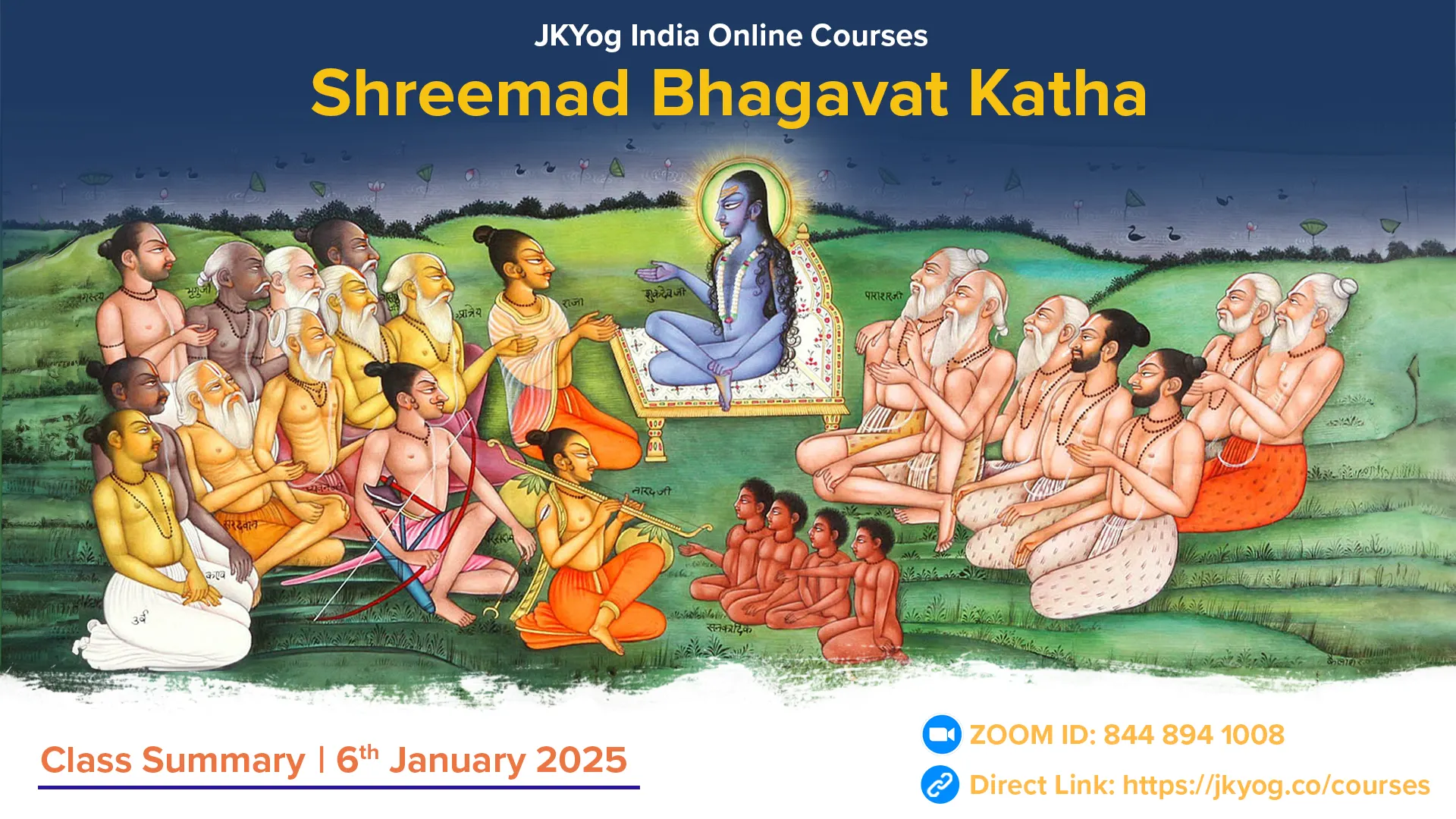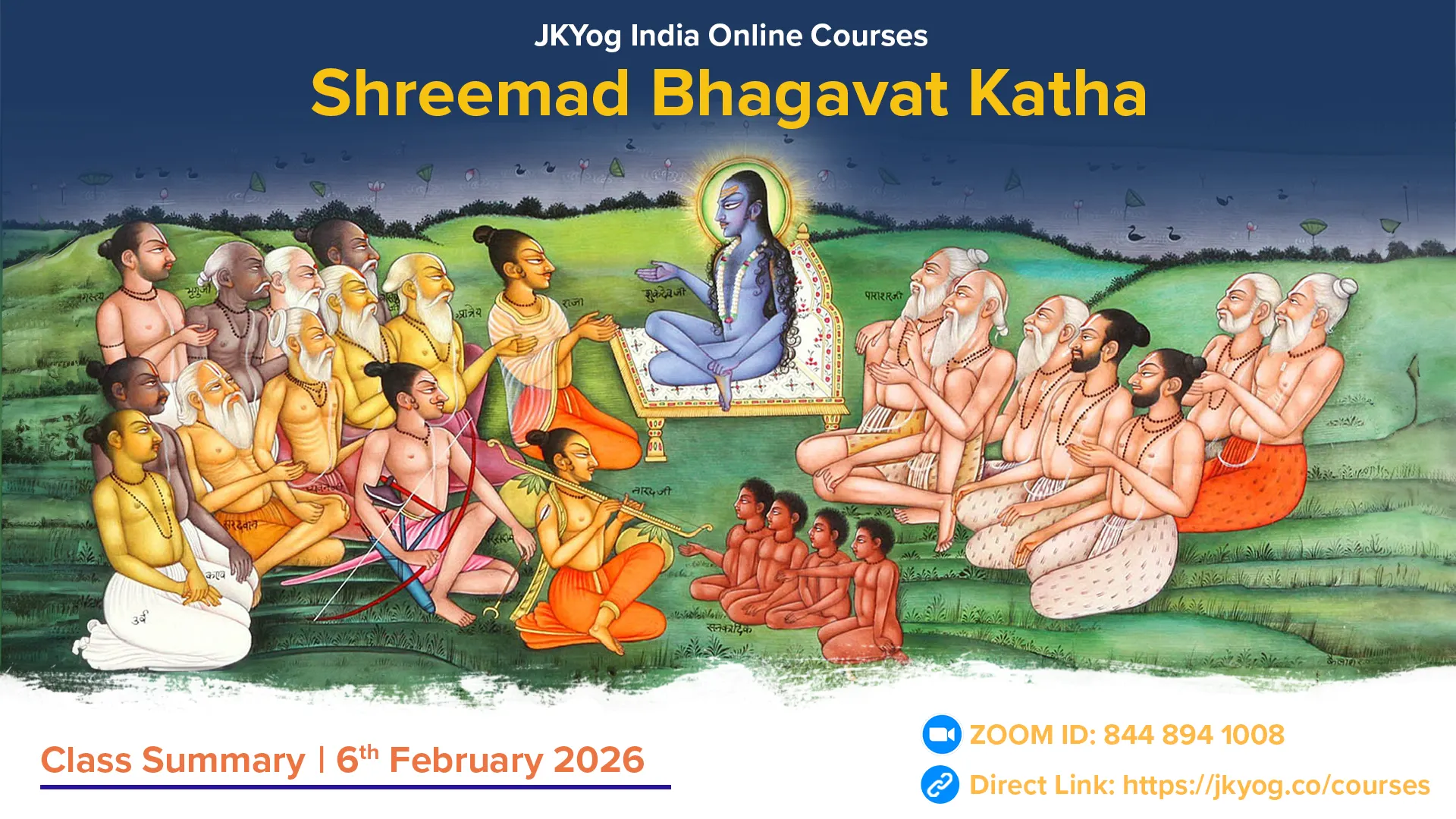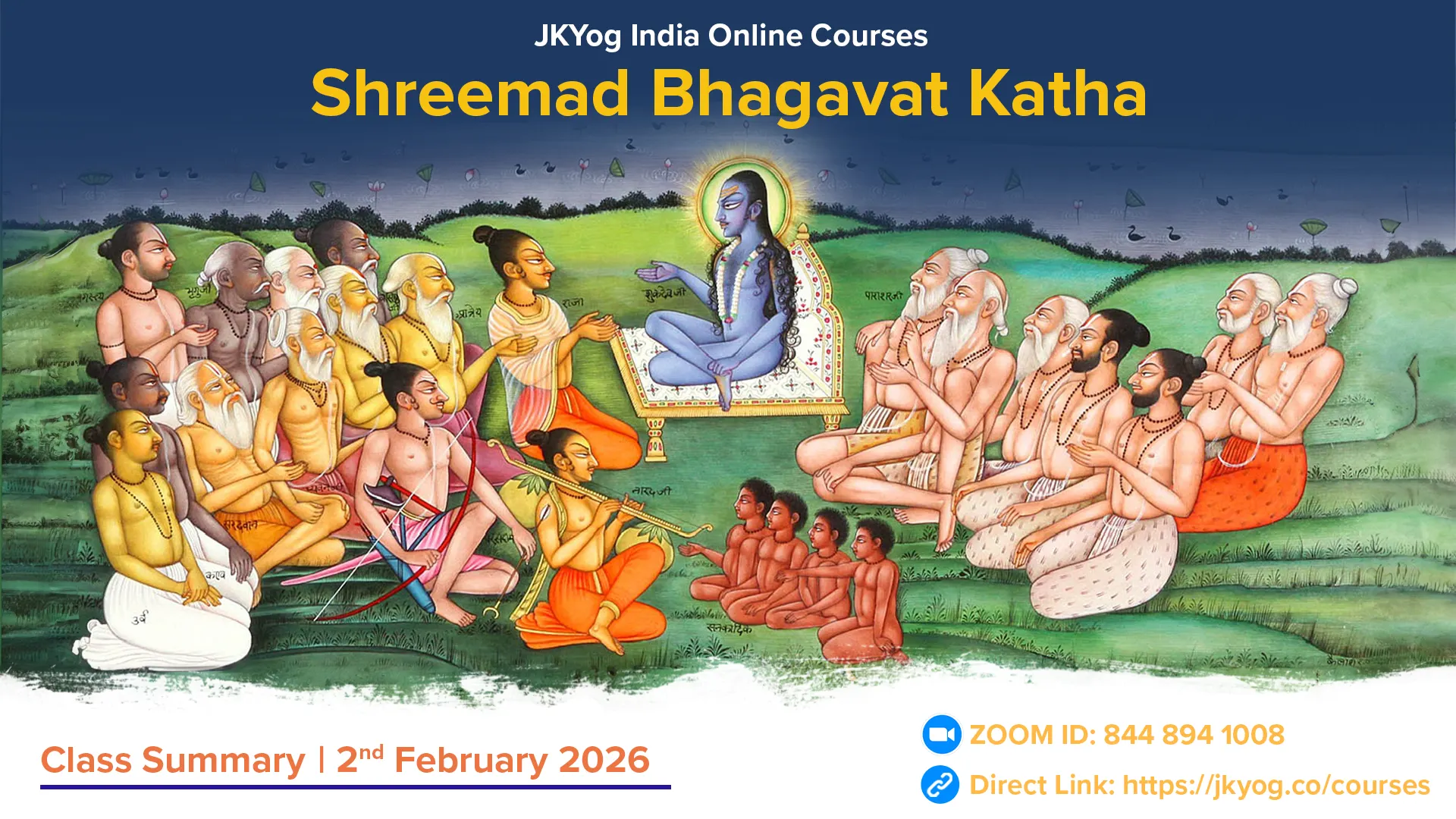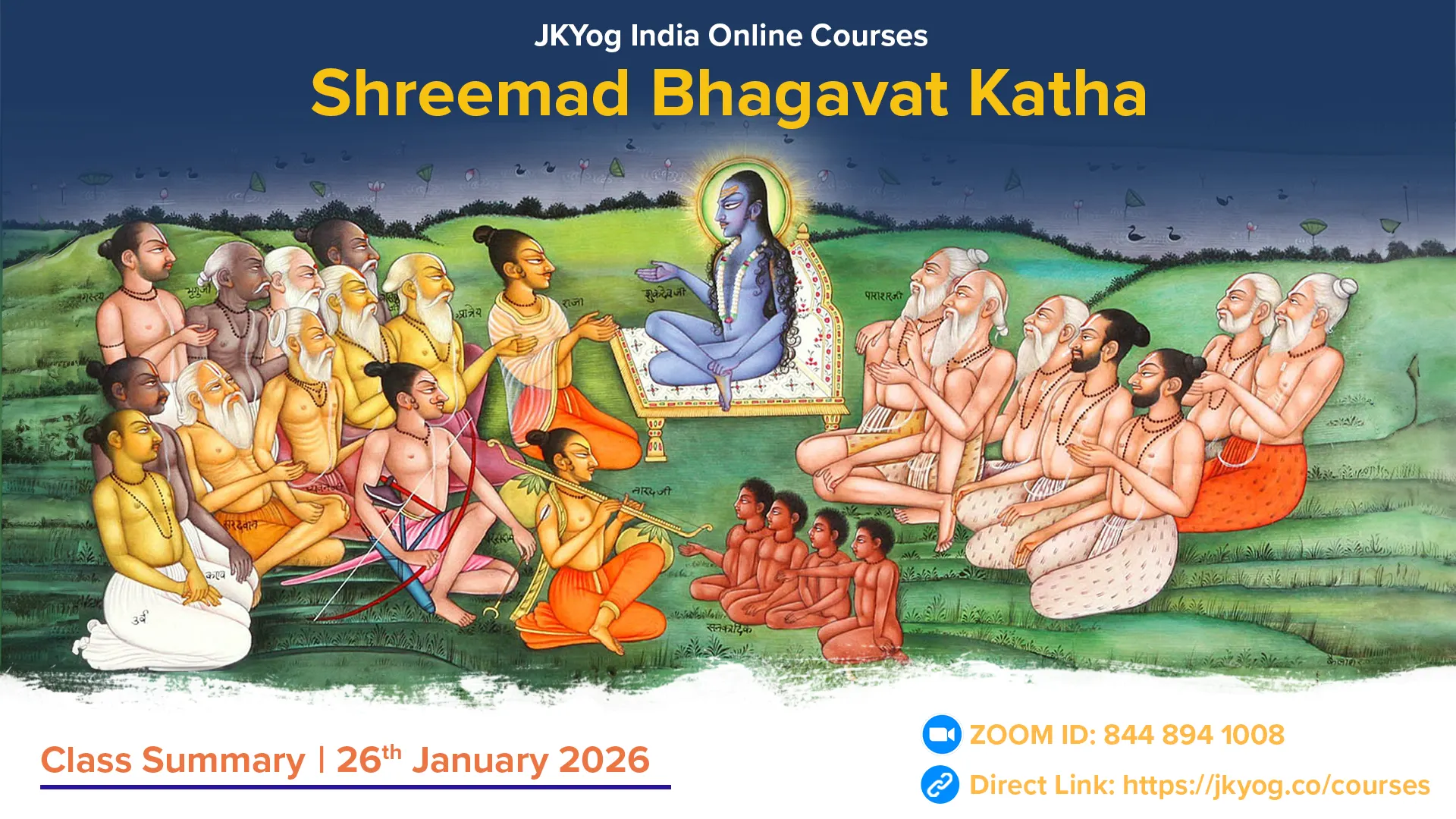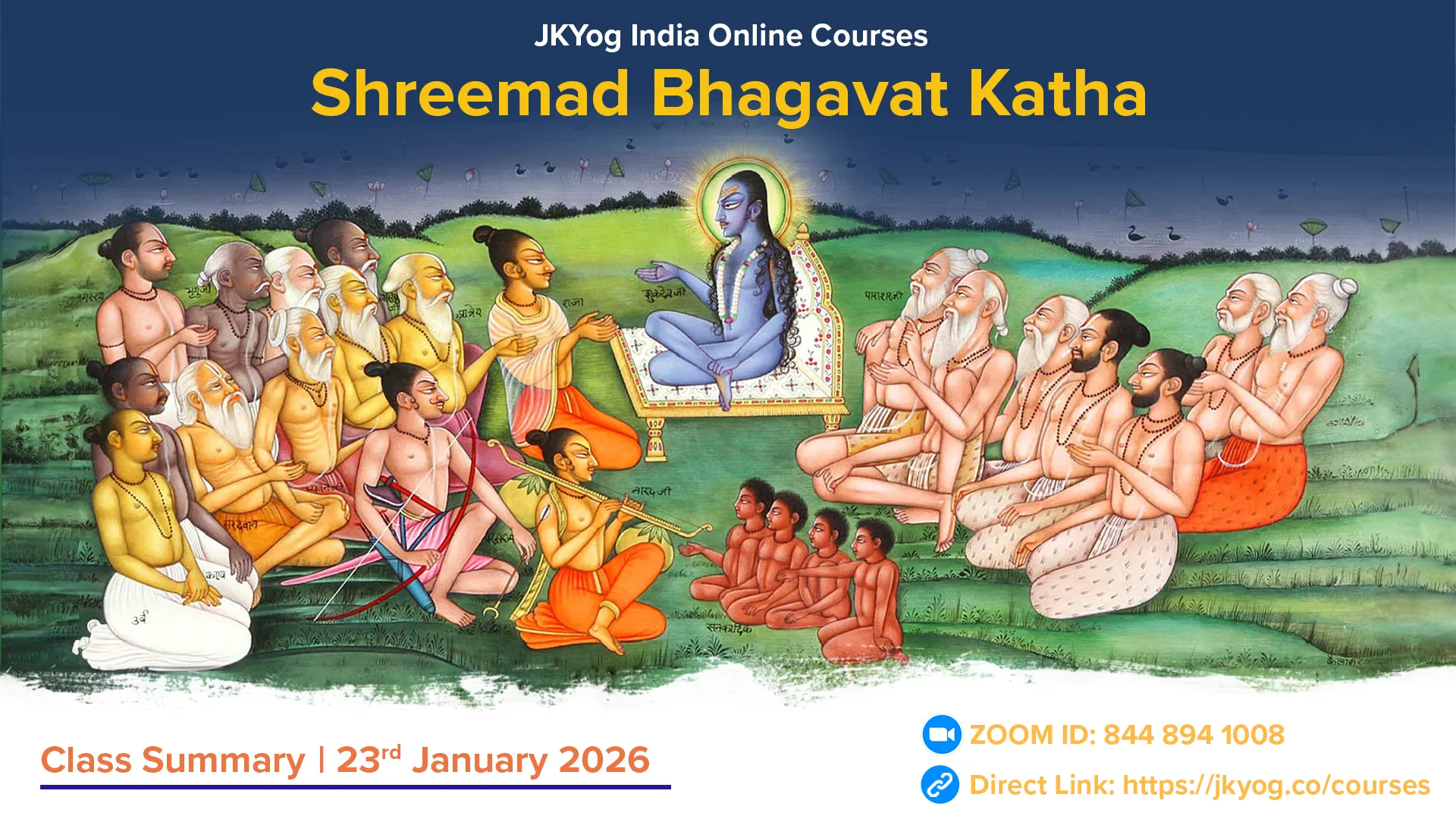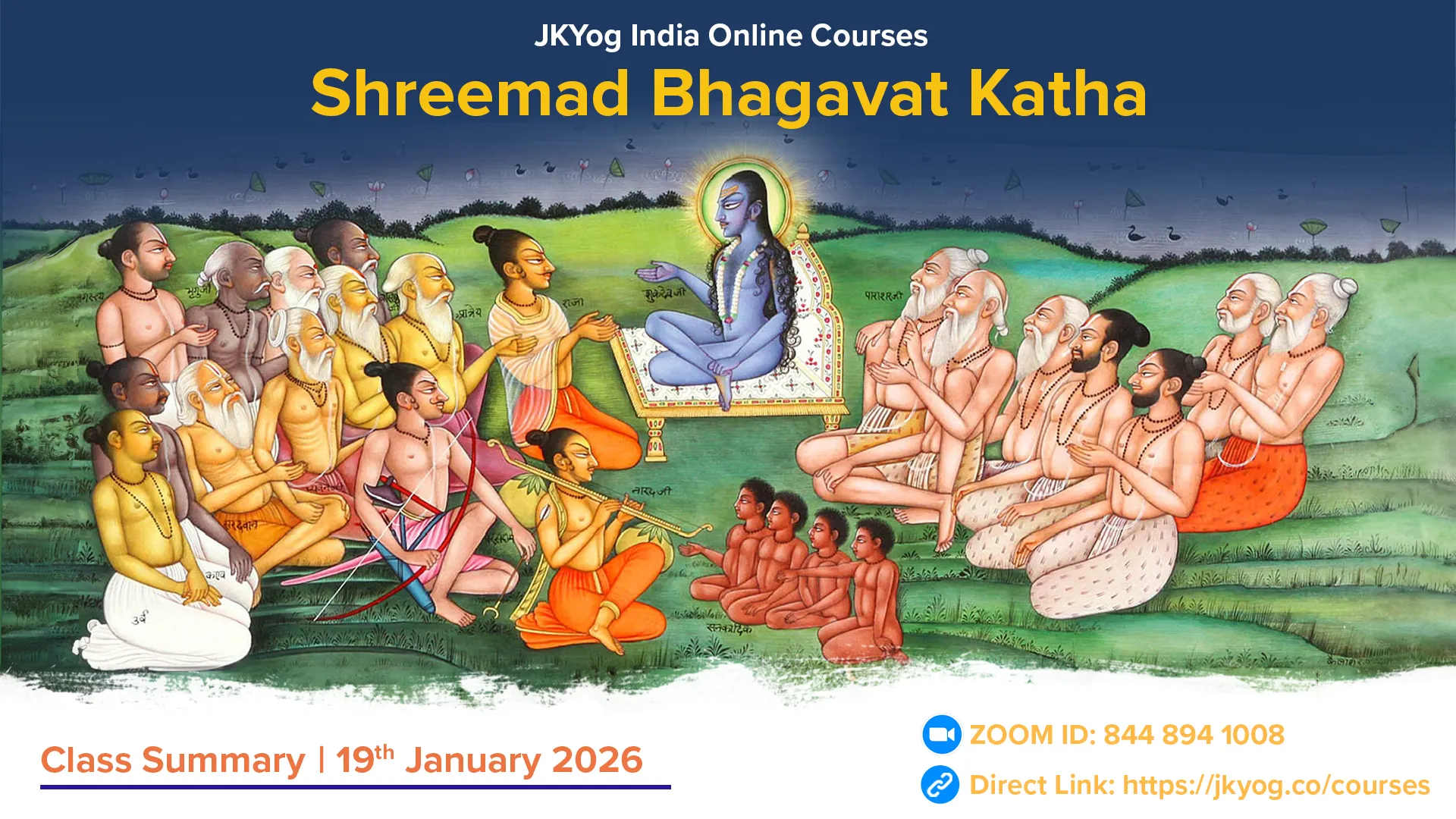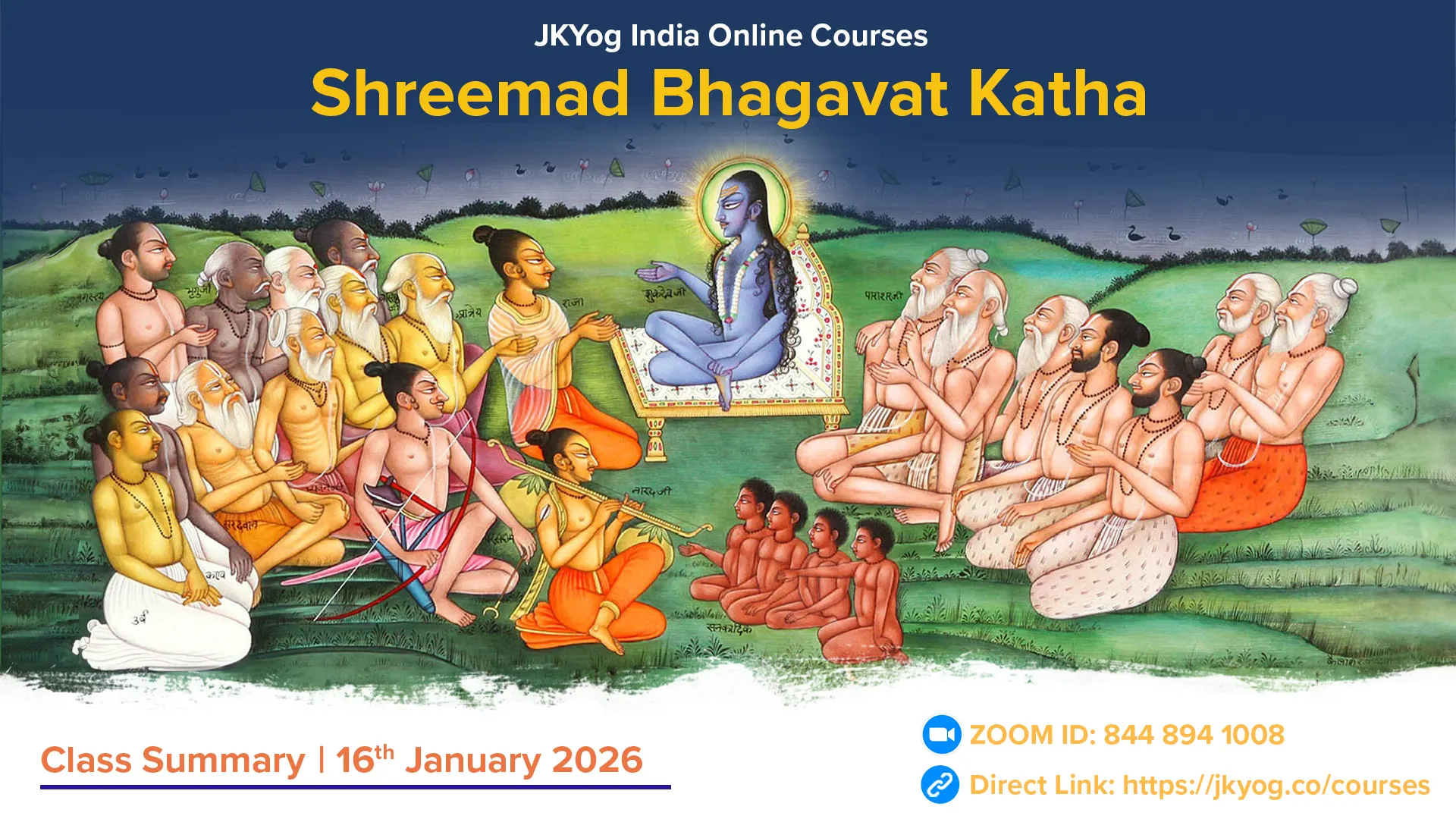Shreemad Bhagavat Mahapuran- Canto: 5, Chapters: 1-5
The children of Swayambhuva Manu and Shatarupa included two sons and three daughters. Among the sons were Priyavrat and Uttanapad (whose son was Dhruv). The three daughters were Akuti, Devahuti, and Prasuti. Akuti was married to Rishi Ruchi, and from them were born Bhagwan Vishnu in the form of 'Yajna' and Lakshmiji's partial incarnation, 'Dakshina.' Devahuti was married to Kardam Rishi, and their son was Bhagwan Kapil, who imparted the teachings of Sankhya philosophy. Prasuti was married to Daksh Prajapati, from whom Sati was born.
The Lineage of Manu's Son Priyavrat
King Parikshit asked Shukdevji how a devotee of Bhagwan and a self-realised soul like Maharaj Priyavrat could engage in household life, which is often the cause of forgetting one's true self and becoming bound by karma. It is difficult to comprehend how Priyavrat achieved spiritual perfection and unwavering devotion to Bhagwan Shree Krishna while living amidst wives, family, and kingdom.
Shree Shukdevji replied that Priyavrat had been devoted to the lotus feet of Bhagwan Vasudev since his childhood. Through the association and teachings of Naradji, he attained knowledge of the supreme truth. However, his father, Swayambhuva Manu, instructed him to take up the responsibility of ruling the kingdom. Priyavrat was reluctant to accept this duty, fearing that involvement in royal affairs might lead him to forget the essence of the self.
When Brahmaji saw Priyavrat hesitating to accept the throne, He descended from His abode along with the four Vedas, Rishis like Marichi, and other sages. In the heavens, Indra and other devas, as well as Siddhas, Gandharvas, Sadhyas, Charanas, and munis, formed a procession, offering hymns of praise. Receiving such reverence, Brahmaji approached Priyavrat, where Naradji was also present.
Brahmaji addressed Priyavrat and said, "Son, let me explain the ultimate truth to you. No one can bypass the will of Shree Hari—not I, not Mahadevji, not your father Swayambhuva Manu, nor your guru Naradji. Everyone must abide by His divine order. The body, actions, joys, and sorrows all operate under His plan. Just as an animal tied to a rope carries a burden, we, too, are bound by His divine laws.
Even liberated souls take on bodies according to their prarabdha (destined karma), but they remain unaffected by worldly desires. A person enslaved by their senses cannot escape the fear of birth and death, even in a forest. However, one who conquers their senses and becomes established in the self faces no obstacles in household life.
Just as a king residing in a fort defeats his enemies, similarly, one can conquer the senses while living the life of a householder. Once victory over the senses is achieved, such a person is free to move anywhere without any constraints."
Shree Shukdevji narrates that Brahmaji advised Priyavrat, saying, "You have already taken refuge at the lotus feet of Shree Hari and conquered your six internal enemies (desire, anger, etc.). Still, first experience the enjoyments allotted to you by Bhagwan, and later detach yourself from them to remain established in your true self."
Hearing Brahmaji's counsel, Priyavrat humbly bowed his head and respectfully accepted the command, saying, "As you wish." With Brahmaji's blessings, Manu fulfilled his desire and, with the consent of Devarshi Naradji, entrusted Priyavrat with the responsibility of protecting the entire earthly realm. Thereafter, Manu renounced any personal desire for material enjoyment and detached himself from worldly entanglements.
Priyavrat, who was already deeply devoted to Bhagwan's lotus feet and had eradicated all impurities such as attachment and aversion, took up the task of ruling the Earth out of respect for the elders' instructions and in alignment with God's will.
Subsequently, Priyavrat married Barhishmati, the daughter of Prajapati Vishwakarma. They had ten sons, all of whom were virtuous, talented, dutiful, handsome, and powerful like their father. They also had a daughter named Urjaswati. Priyavrat's sons were named Agnidhra, Idhmajihva, Yajñabahu, Mahavir, Hiranyareta, Ghritaprishta, Savan, Medhatithi, Vītihotra, and Kavi. These names are also associated with Agni (fire). Among them, Kavi, Mahavir, and Savan became naishtik brahmacharis (lifelong celibates). From a young age, they practised self-realisation and eventually embraced the renounced order of life (sannyas).
Through his second wife, Maharaj Priyavrat had three sons—Uttam, Tamas, and Raivat—who became rulers of the manvantaras bearing their names. He married his daughter, Urjasvati, to Shukracharya, and from their union, Shukra's daughter, Devayani, was born.
King Priyavrat ruled the Earth for 1.1 billion years. When he would draw his bowstring and release it with a mighty twang, the enemies of Dharma would tremble in fear and flee. Outwardly, Priyavrat appeared to be absorbed in worldly pleasures like an ordinary man, but internally, he remained completely unattached to them.
Once, Priyavrat noticed that as Suryadev circled Mount Sumeru, only half of the Bhulok was illuminated, while the other half remained shrouded in darkness. He found this unsatisfactory. Resolving to "turn night into day," Priyavrat ascended a luminous chariot as swift as the Sun itself and, like a second Sun, circled the Bhulok seven times.
Due to his profound devotion to God, Priyavrat's divine power had greatly increased. As the wheels of his chariot moved, they carved deep tracks, which became the seven great seas. These seas divided the Bhulok into seven islands, or dwipas, named Jambu, Plaksha, Shalmali, Kusha, Krauncha, Shaka, and Pushkara.
Each successive island was twice the size of the previous one, and the seas surrounded them, stretching outward in concentric circles. The seven seas were filled with substances of different types: salty water, sugarcane juice, wine, ghee (clarified butter), milk, curd, and sweet water. These seas served as moats encircling the islands, with each sea being equal in size to the island it surrounded.
Thus, King Priyavrat, endowed with unparalleled strength and valor, once, seeing himself caught in the material world again despite having taken refuge at the feet of Devarshi Narad, became distressed and, feeling detached in his heart, began to speak inwardly.
"Oh! This is terrible! My sense-driven desire has led me into this pit of ignorance and worldly attachment. Enough is enough! Alas! I have become like a playful creature at the hands of a woman! She has made me dance like a monkey! I curse myself! I curse myself!"
In this state, by the grace of God, his wisdom awakened, and he developed a detachment from worldly pleasures. Priyavrat distributed all of his kingdom among his sons and left his wife with royal comforts. He then, reflecting on Bhagwan's divine pastimes, resolved to follow the path shown by Naradji.
King Agnidhra's Reign
Shree Shukdevji says—When his father Priyavrat became deeply involved in meditation, King Agnidhra, following his father's instructions, began to rule over the people of Jambudweep in accordance with Dharma, treating them as his own children.
Once, in desire for the Pitrilok (realm of ancestors), King Agnidhra went into deep meditation in a valley of Mount Mandarachal and began worshipping Brahmaji. Brahmaji, understanding his wishes, sent an apsara named Purvachitti, who started wandering in the beautiful garden near Agnidhra's ashram. King Agnidhra became captivated by Purvachitti's beauty and allure.
King Agnidhra, who was as wise as the gods and skilled at winning the hearts of women, used sweet words to win over the apsara. Attracted by Agnidhra's intelligence, character, beauty, status, wealth, and generosity, the apsara stayed with him for several thousand years, enjoying both earthly and heavenly pleasures.
Nine sons were born from this union: Nabhi, Kimpurush, Harivarsh, Ilavrit, Ramyak, Hiranyamay, Kurus, Bhadrashv, and Ketumal. King Agnidhra divided Jambudweep into nine parts and assigned each son one part to rule.
Even though King Agnidhra enjoyed material pleasures, he was unsatisfied with them. He considered the apsara Purvachitti his highest purpose and, through Vedic rituals, sought to reach the blissful realms of the ancestors. After his passing, his nine sons married various goddesses residing on Mount Meru, with names such as Merudevi, Pratirupa, Ugradanshtri, Lata, Ramya, Shyama, Nari, Bhadra, and Devviti.
King Nabhi's Reign
Shree Shukdevji said: "Agnidhra's son, Nabhi, wishing to have a son, worshipped Bhagwan Vishnu. Pleased with his devotion, Bhagwan Vishnu appeared before him. Then, Nabhi's priests praised Bhagwan Vishnu and prayed for a son equal to Bhagwan Himself. Bhagwan Vishnu replied: 'The blessing you ask for, to have a son like me, is indeed difficult, for I am unique, and no one is my equal. However, since your words cannot be false, I will manifest myself in a part of my divine form in Nabhi's house.'
After this, Bhagwan Vishnu was incarnated from Merudevi's womb. From birth, Nabhinandan (the son of Nabhi) was adorned with symbols of Bhagwan Vishnu, like the Vajra and Ankush. His qualities, such as equanimity, peace, renunciation, and prosperity, grew day by day, making his influence more powerful. Seeing this, ministers, nature's beings, citizens, Brahmins, and the deities all fervently desired that he rule the Earth. Due to his beauty, proportionate physique, immense fame, brilliance, strength, wealth, renown, courage, and valour, King Nabhi named his son 'Rishabh' (the supreme).
Once, due to envy, Indra withheld rain in Rishabh's kingdom. In response, Yogeshwar Bhagwan Rishabh, laughing at Indra's foolishness, used his Yogmaya power to pour abundant rain over the Ajnabhkhand.
Having attained the best of sons as per his wish, King Nabhi was always immersed in happiness and held a deep affection for his son. King Nabhi understood that his son Rishabh was immensely popular among the citizens, government officials, and ministers. Realising this, King Nabhi appointed him as the emperor of the world so that he could protect his people according to the Vedic principles.
Subsequently, King Nabhi and his wife Merudevi went to the Badarikashram in the Himalayas, where they undertook intense penance and austere practices. In complete meditation, they devoted themselves to Bhagwan Narayan. As a result, King Nabhi attained the Vaikunth Lok over time.
The Story of Bhagwan Rishabhdev
After King Nabhi went to Badarikashram, Bhagwan Rishabhdev understood that his kingdom was his field of work. Therefore, he presented himself as an ideal and taught the duties of a householder. When his education was complete, he gave Guru Dakshina to his guru and then embraced householder life. His wife's name was Jayanti, and they had one hundred sons, all of whom were as powerful and virtuous as Rishabhdev Himself. Among his hundred sons, the eldest, Bharat, was a great and exceptional devotee. In his honour, this Earth came to be known as Bharatvarsha.
Bhagwan Rishabhdev had ninety-nine other sons. Nine of them were named Kushavart, Ilavart, Brahmavart, Malay, Ketu, Bhadrasen, Indrasprik, Vidarbha, and Kikata. Additionally, there were Kavi, Havi, Antariksha, Prabuddha, Pippalayana, Avirotra, Drumila, Chamsa, and Karbhajan, who were all high-level devotees and authorised propagators of the Shreemad Bhagavatam.
By nature, Bhagwan Rishabhdev was completely independent and the embodiment of supreme bliss. He remained calm, composed, affectionate, and compassionate, inspiring people to walk the righteous path while enjoying the worldly aspects of wealth, fame, progeny, pleasures, and ultimately liberation. As people observed his conduct, they, too, followed his example. Despite knowing the profound secrets of the Vedas, Bhagwan Rishabhdev followed the instructions of the Brahmins and adhered to the practices of the common folk. He conducted various yajnas for different deities, following the directions of the scriptures and Brahmins, ensuring the correct materials, time, place, age, devotion, and priests for their execution.
During Bhagwan Rishabhdev's reign, no man in the country desired anything other than a growing attachment and love for God. Moreover, no one even glanced at others' possessions, considering them as illusory as sky flowers.
Teachings of Bhagwan Rishabhdev to His Sons
Once, while travelling, Bhagwan Rishabhdev reached Brahmavart. There, in the assembly of great Brahmarishis, He addressed His sons with a composed mind and with humility and love in the presence of the people, as follows:
Bhagwan Rishabhdevji said:
- The human body is not merely for the enjoyment of sorrowful material pleasures; this body should be used for penance, self-purification, and the attainment of Brahmananda (supreme bliss).
- According to the scriptures, serving true saints is the path to liberation, whereas indulging in sensual pleasures leads to hell. True saints are those who are even-minded, peaceful, free from anger, and always concerned for the welfare of all.
- Those who engage in discussions about material pleasures and act merely to sustain their bodies do not progress toward true spiritual endeavour.
- If a person does not have the inquiry into the self, their true nature remains covered by ignorance, and they remain entangled in the bondage of actions.
- As long as a person does not have love for God, they cannot be freed from the bondage of the body.
- One should understand the actions of the senses with the discrimination of the mind and keep the memory of the true self; otherwise, one remains entangled in both worldly and Vedic actions.
- The wise consider the marital relationship between man and woman a coarse knot in the heart, which generates attachment to 'I' and 'mine'. When this knot of the heart is loosened, a person is freed from the attachment to marriage and attains the supreme state.
- One should be cautious in performing one's duties, controlling the body, senses, mind, and speech, and following the scriptures' teachings and the words of great souls.
- A person who teaches devotion to God to their dear ones is a true guru, father, mother, and deity.
- Bhagwan Rishabhdev said that pure sattva (goodness) is His heart, and this truth is the foundation of His guidance.
- Every living being should serve God regardless of their condition, for this is true worship and the path to liberation.
- Bhagwan Rishabhdev explained that His humble devotees are truly selfless and never desire material things; they only follow the path of devotion.
- True devotion to God is performed through the mind, speech, and senses, which is human life's ultimate goal.
Summary: JKYog India Online Class- Shreemad Bhagavat Katha [Hindi]- 06.01.2025

